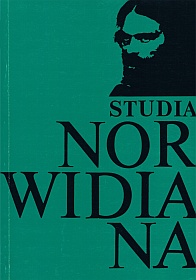Truth in Norwid’s Long Poems
Abstract
The article consists of three sections: introductory, analytic and comparative-synthetic.
In the first section the author presents and briefly justifies her classification of the meanings of truth, a much more extensive one than those found in Polish dictionaries. She also signals an analysis that recognizes the possibility of several meanings of a word (in this case the word truth) cooccurring in a single use.
The analytic section discusses the major uses of truth in three of Norwid's long poems for which the word (and the concept itself) is particularly important: Promethidion, Freedom of the Word and Quidam. The analysis embraces among others ambiguous uses that have given rise to interpretative problems. The author tries to show the wealth of the poet's reflection on truth in each poem; she also discusses the semantic roles and metaphoric import of truth in the text.
The comparative-synthetic section presents among other things quantitative data on the uses of truth in its various senses in the three poems. It becomes evident that Promethidion is marked by particularly frequent multiply ambiguous uses of the word and saturated with epistemic (sense No. 3 in the author's analysis) and ethical (No. 5) senses of the word, and by a relatively high proportion (higher than in the other two poems) of the eschatological-directive sense (sense No. 2: the Kingdom of God; God's Law). Promethidion and Quidam contain more occurrences of truth than does Freedom of the Word in the sense of ‘Infinite Being'. These quantitative differences are connected with the overall direction of Norwid's reflections on truth in the three poems. The crucial motif in Promethidion is the need for “the pure air of truth” in the life of society, the importance of a life of truth and struggle for truth that is conducted in a special way by prophets and martyrs, but also by all those who “follow the Saviour with their own crosses”. Freedom of the Word brings out in particular the relation between truth and the various stages of the Holy History, and especially the complexities of the history of truth in Christian times. Quidam is first of all a poem dealing with the drama of the human desire and search for the ultimate truth of Being in the dark time of crisis between two epochs. Matched with this is a different choice of metaphors. Quidam lacks the metaphors of light (characteristic of Promethidion) and acoustic metaphors (which occur in the Freedom of the Word). The dominant metaphor in Quidam is one of truth as an object, something that is sought, touched and discovered. Quidam also differs from the other poems in employing attitude towards truth as a means of characterization of individuals and groups. This is connected with the epic nature of the poem.
One element that links the three poems is the problem of dangers to truth in the human world. Each poem presents the problem in a somewhat different way and using different imagery.
Copyright (c) 1991-1992 Studia Norwidiana

This work is licensed under a Creative Commons Attribution-NonCommercial-NoDerivatives 4.0 International License.





